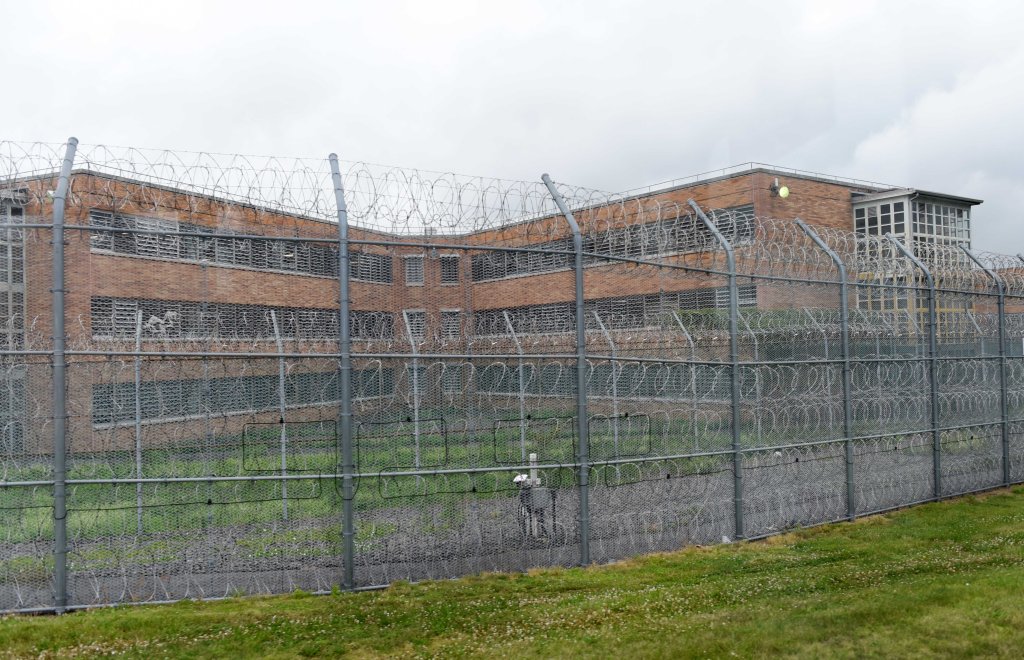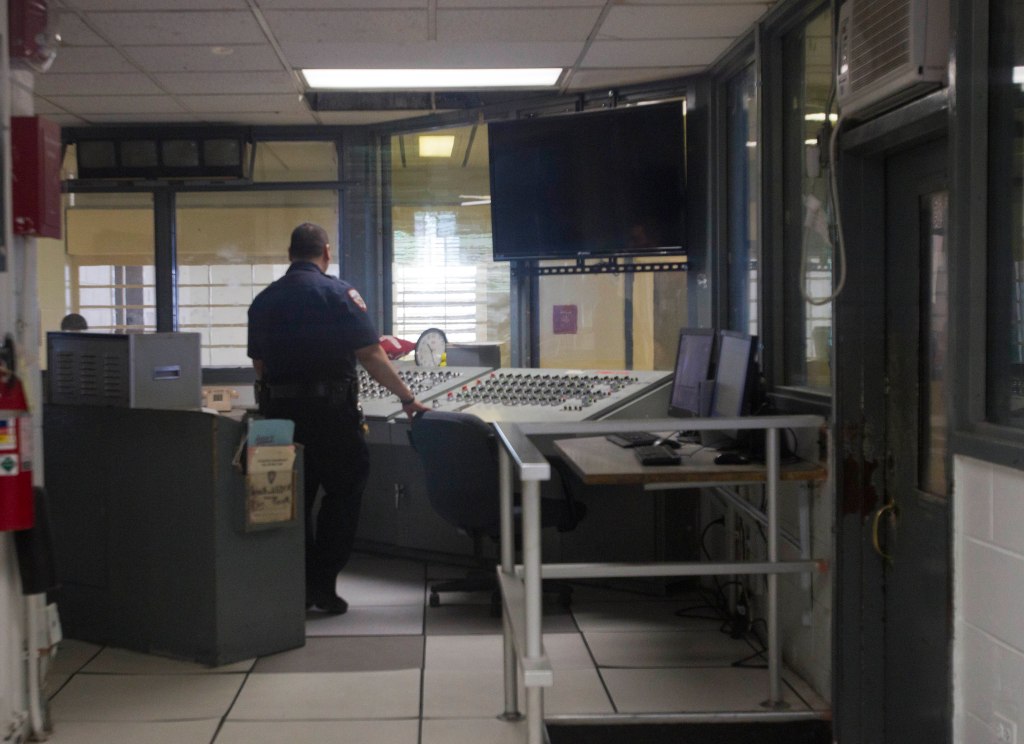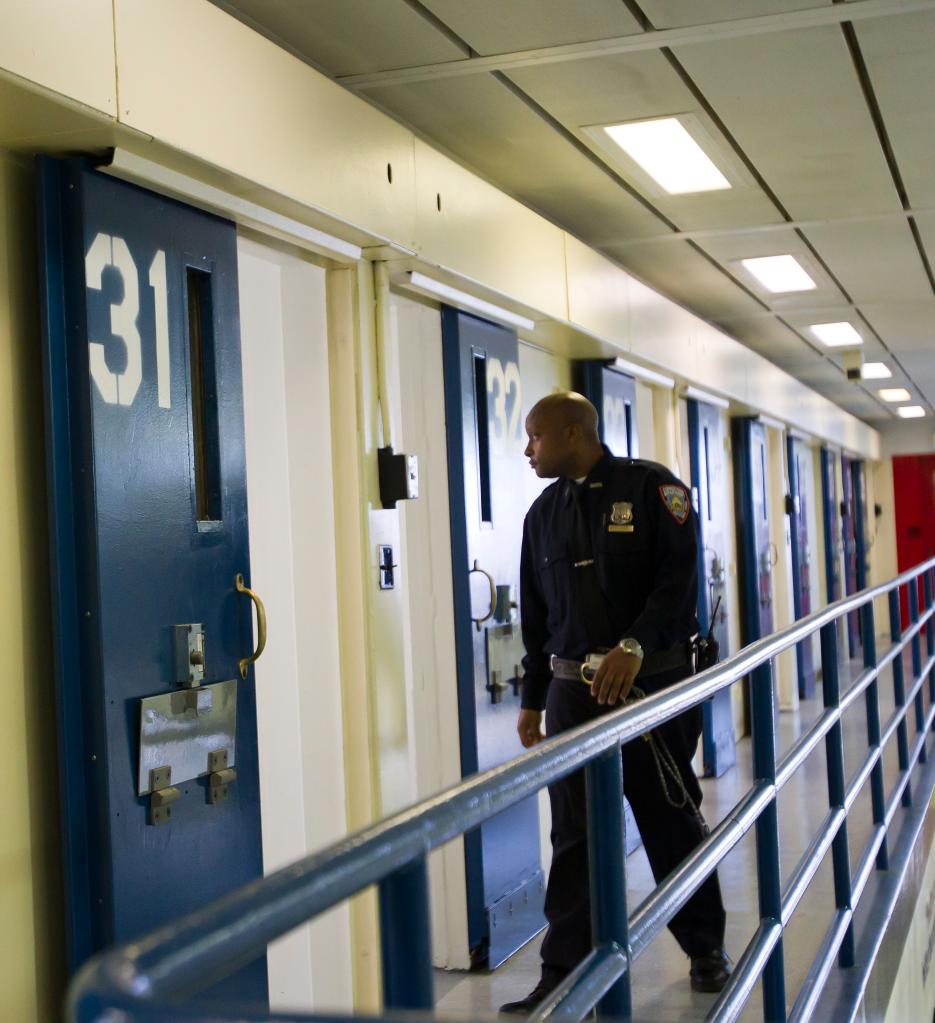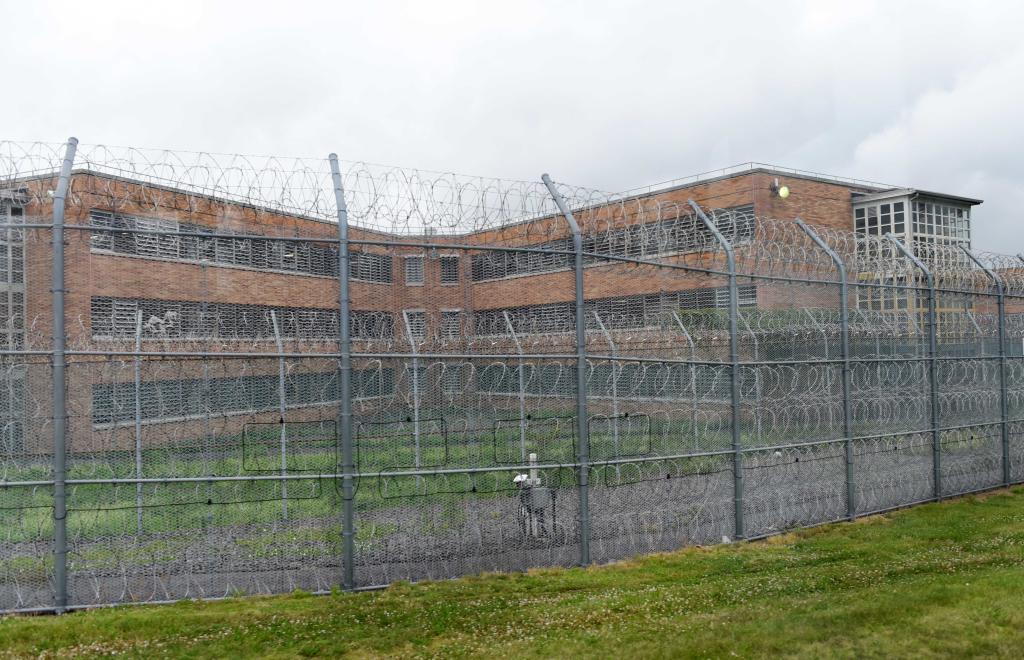Rikers inmate chokes female correction officer weeks after another attack left guard with fractured nasal bones
Contact The Author
A crazed inmate nearly choked out a female correction officer on Rikers Island Friday night — less than five weeks after a different inmate belted a female guard in the face because he wasn’t happy with his cell block, The Post has learned.
The hulking inmates’ shock-and-awe assaults left both women with injuries and shattered psyches, the traumatized victims told The Post this week in exclusive interviews.
“I suffered a broken nose from this, I had black eyes, I can’t sleep at night and I’m [jumpy] still,” said one officer, a 40-year-old mothere of three who was decked by an inmate after he unexpectedly charged out of his cell Jan. 15.
“I’m afraid to go back to work because I’m afraid that something like this may happen to me again,” she continued. “And it may be a lot worse this time.”
Friday’s victim — a 33-year-old correction officer — also said she she was wary of returning to the notoriously violent jail after alleged Crips gang member David Rhinehart grabbed her by the throat.
She fought back but the 6-foot-4, 210-pound inmate overpowered her, she said.
“I used all my force trying to get him at least to let go of me,” she said. “But he wouldn’t let go.”
Three inmates eventually wrenched Rhinehart off the beleaguered officer, who went to the hospital afterward, according to the allegations against him.
“Honestly, it’s scary now,” she said, adding that her arms, knees and back are killing her after the assault. “Now that I experienced this, I see things differently. I hear stories, but you’re never gonna think, ‘OK, this is gonna’ be me today.’
“I’m scared,” she continued. “Am I going to get attacked again?”
Now, the officers — and the union that represents them — are calling to reverse a ban on the use of solitary confinement as punishment for the most violent inmates.
They blasted City Council Speaker Adrienne Adams for pushing a recently enacted law banning so-called “punitive segregation” — which they say emboldened inmates and hung correction officers out to dry in the process.
“If these same heinous attacks against these two female officers had occurred on the streets of Council Speaker Adrienne Adams’ council district, she would have been outraged and held a press conference condemning these attacks,” Benny Boscio, president of the Correction Officers’ Benevolent Association, told The Post in a statement.
“Instead, she pushed the City Council to pass a law banning punitive segregation that will give our most violent offenders a meaningless four-hour time out,” he continued. “Since when did our officers’ rights to be safe in their workplace get thrown out the window simply because they wear a shield on their chest? This is disgraceful!”
The correction officer who was punched last month said she felt “there’s not going to be any consequences” for the inmate who attacked her.
A City Council spokesperson told The Post, “The pervasive humanitarian crisis on Rikers that inflicts violence on both detainees and staff is not keeping anyone safe.”
“The law preventing the use of prolonged isolation and solitary has not yet taken effect, and is intended to address the ongoing harm in city jails that will continue unabated under current policies and practices,” the spokesperson added. “Confronting this violence and reducing incidents like these will require reforms like ending solitary confinement in all forms and closing Rikers once and for all.”
Mayor Eric Adams vetoed the controversial solitary confinement bill in January, claiming it would make jails more dangerous for inmates and staff alike.
But the City Council brushed off his concerns and overrode the veto on Jan. 30.
New York City banned outright solitary confinement — which put prisoners in 23-hour lockdown — back in June 2019.
Instead, inmates had to be allowed out of their cells for at least four hours every day, according to the NYC Board of Correction website.
The new law goes even further, mandating guards can only isolate inmates who pose an immediate risk of violence for a maximum of four hours.
And although they can isolate violent inmates for longer, the imprisoned must be allowed out of their cells for 14 hours a day and have access to the same programming as other inmates.
But the jail has long had issues with its solitary confinement practices — most notably after former inmate Kalief Browder, 22, hanged himself in 2015.
He’d spent three years at the jail, half of it in solitary. His death sparked a wave of reform efforts that led to the city’s decision to stop using the practice for juvenile inmates.
‘Their punishment is just not enough’
But union officials say the city’s decision to get rid of 23-hour lockdowns has sparked an uptick in assaults on correction officers.
They pointed to the recent attacks — both of which happened at the Otis Bantum Correctional Center — as proof.
In the Jan. 15 incident, the 40-year-old correction officer told The Post that she was attacked during a routine cell check at about 7 a.m.
One of the inmates, Gerber Argueta, had cloaked his window with a sheet, she said.
When she opened the cell door to check on him, the 6-foot-2-inch, 240-pound man allegedly bolted out and punched her square in the face.
She and her partner then wrestled and fought the enraged Argueta — who was angry about being transferred to general population — for about nine minutes, she said.
Eventually, the pair allegedly wore him down and got control. But not before she’d been beaten and bloodied, she said.
Her sons wept when they saw her, and begged her to find a new job, according to the correction officer. She is now dealing with a set of symptoms that hint at post-traumatic stress disorder, she added.
“I’m not sleeping at night,” the Westchester County woman told The Post. “I can’t explain what it is. But it’s just like, I’m not in the right place. I’m just scared of everybody I see.”
The Friday night assault on the 33-year-old female correction officer happened in similar fashion, the woman told The Post.
She was sitting at her post at about 7:50 p.m. when inmate Rhinehart allegedly began acting strange — making erratic movements, spinning around and throwing himself to the floor.
Suddenly the alleged gangbanger turned on her, raced up and seized her throat in his hands, she said.
Days after the assault, she said the lack of consequences for misbehaving inmates contributed to the wild assaults.
“I feel like these individuals — their punishment is just not enough for them to stop doing what they’re doing,” the 33-year-old guard said. “It’s like, whatever to them. They’re really not getting punished, so they do not care.”
She wanted punitive segregation to stay in place — the inmates know it’s on its way out, and they act accordingly, she said.
“It’s like, ‘OK, we don’t have to go to that anymore,’” she said. “Basically it’s, ‘Let’s just do whatever we want to do, because we’re already in jail. What else could they do?’”
Additional reporting by Tina Moore, Post wires.













